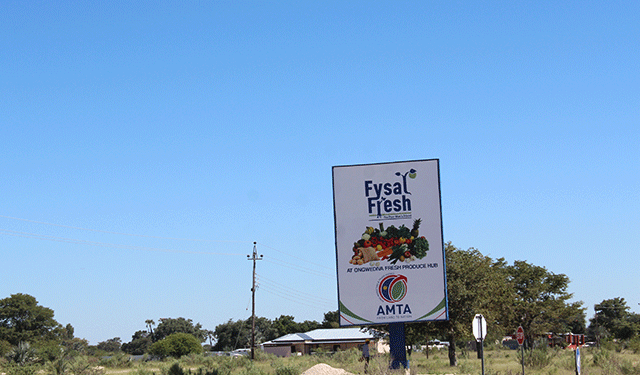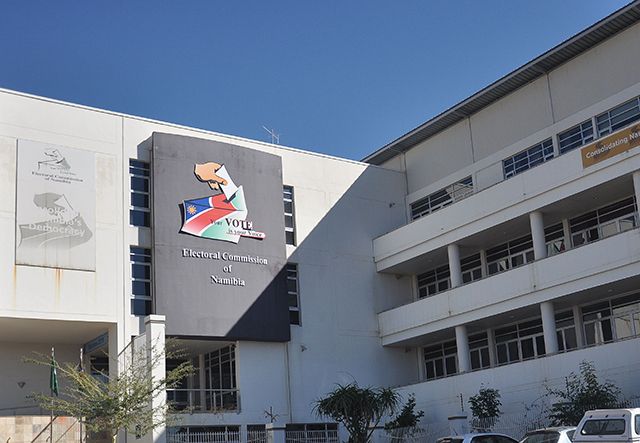THE Agro-Marketing Trade Agency (Amta) set up to support small-scale farmers has ceded control of its fresh produce hub to a South African private company.
Amta, established in 2013 as part of Vision 2030’s commitment to ensuring food security at both national and household level, has fresh produce hubs at Rundu, Ongwediva and in Windhoek.
Sources who saw the agreement between Amta and Fysal, said it is dated 21 February 2018 and shows that Fysal, which imports its produce from South Africa, will now stock 56% of the fresh produce hubs.
This means that Amta, which was supposed to create a sustainable, community-driven agricultural development that reduces poverty and creates sustainable markets linked to rural economies, will provide 44%.
The sources also said that Ongwediva Amta regional manager Jacob Hamutenya signed the agreement on behalf of the agency, and Fysal Brenner, the private company’s executive chairman, signed on behalf of Fysal.
also understands that according to the agreement, Fysal undertook to buy products from various producers in Namibia as well as the SADC region, and to transact 120 metric tonnes of produce per month.
The agreement, the sources further said, also stipulates that Fysal must have produce on their floors at all times to meet monthly targets, as well as procure sufficient produce to keep the hubs busy.
Also, the sources added, the agreement states that Fysal should provide a N$150 000 bank guarantee, or pay cash to Amta’s trust account, in addition to paying a monthly rental fee of N$3 500 for floor space and the cold room, as well as for utilities such as forklifts, bins, crates and pallets at Ongwediva.
Fysal Fresh Produce chairperson Tomas Iindji told on Sunday that when Amta was designed, it was to assist small-scale farmers.
The government then created an agricultural hub, which is to supply produce to Amta.
However, according to Iindji, who also doubles as the Namibia Chamber of Commerce and Industry (NCCI) northern branch chairperson, the farmers were unable to keep up with the logistics, which became too costly for them.
“Agents do not have money. The produce is sensitive, and has a short lifespan. So, farmers felt they made a loss when they sold to Amta as compared to when they sell on the open market.
“Amta then failed to have enough stock, and the only money available was to pay employees, and they were not making any profit,” he explained.
Iindji said Fysal then approached Amta to enquire where they could help. They thus presented to Amta an expression of interest.
“Amta was happy with the presentation, and Fysal came on board. Whatever they bring, it should come from local farmers,” he noted.
He added that the agreement outlined that 56% of Fysal products can be imported, and 44% should come from local farmers. But in the event that there are no potatoes in the country, Fysal can import.
Currently, Fysal serves Angola, as well as other stores in Namibia which include Spar, Pik n Pay and Choppies.
Iindji said for farmers to succeed, they will need support from government, otherwise they will not make it.
Fysal group CEO Ismael Davids said Amta’s traders left the business and there was no stock, so the hub could not cope.
He said Fysal as a wholesale trader then came in to save the day.
“They (individual farmers) couldn’t cope, they didn’t have the resources, so we revived the centre,” Davids asserted.
Questioned on how they were promoting the Growth at Home strategy, as this is the reason why Amta was started, he said they will only import what Namibia does not have. At the moment, Namibia has sufficient vegetables.
“The country does not have fruits, and is unable to produce them. That is what we import. We took the responsibility from the traders. They are not big enough, and they do not have the capacity, and we have the transport capacity to supply,” Davids added.
Amta managing director Lucas Lungameni confirmed some of the contractual agreements to yesterday.
“If there is any farmer out there who can do the opposite of Fysal, please come. You will fulfil our dreams and that of any Namibian. I need that farmer with products that they can produce,” Lungameni challenged.
He explained that the 56/44% is allowed by the market share promotion, and applies to everyone, including Fysal.
The agriculture ministry’s mandate is to promote, develop, manage and utilise agriculture, water and forestry resources. For farmers to succeed and to be able to supply Amta successfully, they will need support from the ministry.
The ministry, through its deputy minister, could not provide comment as questions sent to them went unanswered, and they promised to give feedback by the end of today.
Stay informed with The Namibian – your source for credible journalism. Get in-depth reporting and opinions for
only N$85 a month. Invest in journalism, invest in democracy –
Subscribe Now!






